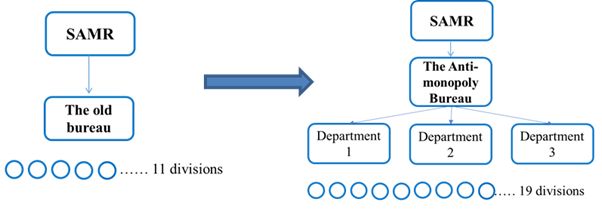- within Litigation and Mediation & Arbitration topic(s)
China has recently witnessed landscape reform in the antitrust regime at the end of 2021: the draft amendment ("Draft Amendment") to the Anti-Monopoly Law ("AML") was published for public comments on 23 October and the national anti-monopoly bureau ("Anti-monopoly Bureau") was inaugurated in Beijing on 18 November. With the law amendment and the institutional reshuffle, some widely held perception of antitrust practice in China should be refreshed. Here we organize the key points that every company with business in China should know about the latest reform.
I. The Law Amendment: Slight change of rules while severer liabilities
The current AML came into effect in 2008 and the amendment work started in around 2017. On 23 October, the latest draft version, the Draft Amendment, was published to seek public comments by the Standing Committee of the National People's Congress. Compared to previously released draft versions, the Draft Amendment do not make substantial change of its articles, yet the liabilities for all types of illegal practice are largely increased.
The Draft Amendment include 70 Articles, 12 more articles compared to the current AML, covering regulations on monopoly agreements, abuse of dominant market position, merger control, administrative monopoly as well as legal liabilities. The major revisions are as follows:
- Hub-and-spoke cartel: The Draft Amendment expressly prohibit hub-and-spoke cartel and provide for the same legal liabilities for both the hub and spoke. In some previous cases, the hub was not penalized due to lack of clear rules in the AML.
- Safe harbors for monopoly agreements: All types of monopoly agreements can be exempted if the market share threshold is met, which will be stipulated by the authority in separate regulations.
- Highlight on the tech industry: Abuse of data, algorithm, technologies, and platform rules that leading to imposition of unfair restrictions on undertakings is expressly listed as abuse of dominant market position.
- "Stopping the clock" introduced for merger review: The timeframes of merger review can be suspended under three specific circumstances, including the filing parties' failure to submit materials as required, occurrence of major situation changes, and, with the consent of the filing parties, necessity for further review of the remedy proposal.
- Public interest lawsuit for monopoly practice: If certain monopolistic behaviors caused detriment to public interests, the procuratorates can bring a civil litigation against it.
The most significant amendment lies on the legal liabilities. Not only the penalty for existing liabilities rises sharply but includes new liabilities including penalties on individuals. The details of the new liability rules are as follow:
| Practice / Item | Liabilities |
| Illegal merger / gun-jumping |
|
| Monopoly agreements |
|
| Abuse of dominant market position |
|
| Personal liabilities | Individuals, including the representatives (such as the CEO) of undertakings, project managers and others who oversees the project, if are found to be responsible for reaching monopoly agreements, will personally face liability of fine up to RMB 1,000,000 (approx. US$150,000). |
| Multiple fines for severe monopolistic practice | For monopolistic practices, including illegal merger, monopoly agreements and abuse of dominant market position, that have far-reaching adverse consequence, a fine of 200% to 500% of the above amounts will be imposed. |
| Credit records | Undertakings found to break the AML, will be registered in China's national enterprise credit record which is available to the public and can impact the undertakings' qualification in certain government and public procurement. |
II. The Institutional Reshuffle: Launch of the Anti-monopoly Bureau
The Anti-monopoly Bureau is not newly created. There had been an anti-monopoly bureau under the State Administration for Market Regulation ("SAMR"), the well-known Chinese antitrust watchdog, that oversaw antitrust supervision. The inauguration is a level-up of the previous bureau.1 The most significant change is that the old bureau with 11 divisions expands to the Anti-monopoly Bureau with three departments and 19 divisions.

The three new departments oversee different aspects of antitrust supervision, and their major functions are as follows:
- Department 1: Coordination of competition policy implementation.
- Department 2: Supervision of monopoly agreements and abuse of dominant market position.
- Department 3: Merger control and investigation of gun-jumping.
It is worth mentioning that both Department 2&3 establish a division targeting specifically the antitrust supervision in digital economy, which shows China's determination to tackle the monopoly issues in the tech industry.
A growth of enforcement staff will take place during the reform. With higher authority and sufficient law enforcement power, the Anti-monopoly Bureau is expected to mount antitrust crackdown campaign targeting all industries, including the internet sector.
III. What will happen afterwards?
The period for seeking public comment of the Draft Amendment closed recently. It is possible that the new law will be released in 2022. With the anticipation of the severer legal liabilities, particularly for gun-jumping, some undertakings have voluntarily contacted SAMR for their gun-jumping transactions in the past, given that the current fine on gun-jumping is only up to RMB 500,000 (approx. US$80,000).
Also, the Anti-monopoly Bureau will hire more officials in 2022 to fill up its 19 divisions. By the institutional reshuffle and law amendment, China is determined to strengthen enforcement against monopolistic practices in all industries. Companies with business in China are recommended to heed the risks and take compliance measures accordingly, at least they need to inform their CEOs of personal liabilities under the Draft Amendment.
Footnote
1. The old bureau is called Anti-monopoly Bureau of SAMR; the new bureau is named as State Anti-monopoly Bureau which is kind of level up but is still supervised by SMAR.
The content of this article is intended to provide a general guide to the subject matter. Specialist advice should be sought about your specific circumstances.



